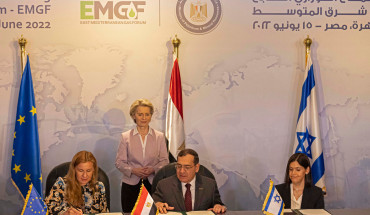
Purpose
The Middle East Institute (MEI) is a private, non-profit, nonpartisan institution working to increase knowledge of the Middle East among citizens of the United States and to promote a better understanding of the people of these two areas. MEI is not affiliated or aligned with any domestic or foreign political party, institution, or government.
The Institute aims to contribute to crafting better policy to the benefit of the people of the Middle East and the United States, and in the general interest of peace, human security, prosperity, and improved governance. MEI is committed to maintaining the highest standards of integrity and ethical conduct in all of its activities and promotes transparency and intellectual independence as central to its mission.
In accordance with this objective, MEI has adopted the below policy to avoid and mitigate Conflicts of Interest or the appearance of Conflicts of Interest. This Policy applies to all MEI personnel, including resident and non-resident scholars as well as general staff.
Definition
A conflict of interest arises when a person has an actual or potential interest or outside activity that impairs or might appear to impair his or her independence or objectivity in the discharge of his or her responsibilities and duties to the Middle East Institute or when representing the Institute. (‘Representation’ includes display of one’s affiliation to the Institute, even when speaking on one’s own behalf).
Examples of outside activities that may create conflicts of interest include:
-
Lobbying or advocacy: Engaging in activities that promote the interests of a particular individual, organization, or foreign government.
-
Business activities: Holding positions in businesses or engaging in entrepreneurial activities that could potentially influence your work.
-
Speaking engagements or consulting: Giving speeches or consulting for companies, organizations, or foreign governments that could be perceived as compromising your independence and impartiality.
-
Financial interests: Holding financial interests in foreign companies or investments that could influence your decision-making or create conflicts of interest.
-
Personal relationships: Having personal relationships with individuals who may have business or financial interests that could influence your work.
Personnel should err on the side of caution and make full disclosure of any situation that might impair or appear to impair their independence or objectivity. If they have questions regarding compliance with this Policy in specific circumstances, they should contact their supervisor and/or the President.
Disclosure
MEI personnel are required to disclose any and all outside activities that could pose potential conflicts of interest at the time they are hired or become affiliated with the Institute and on an annual basis afterwards.
The Middle East Institute reserves the right to publicly disclose relevant Outside Activities of Personnel in case a conflict of interest is discovered.
Prohibitions
Foreign Agents Registration Act compliance
MEI personnel are prohibited from activities that would require them to register as a foreign agent under the Foreign Agents Registration Act (FARA). This includes engaging in any political or lobbying activity on behalf of or at the direction of a foreign government.
Truth in Testimony
Personnel who cite their affiliation to MEI when they provide expert testimony to Congress are required to declare that their statements represent their own views and opinions, and do not represent a position of the Institute, which does not take positions on policy issues. Additionally, they must disclose any MEI grants that may be directly or indirectly related to their testimony in the interest of transparency.
Enforcement
If the Institute’s management has reasonable cause to believe that MEI personnel has failed to disclose an actual or possible Interest or otherwise violated this Policy, it shall inform the Personnel of the basis for such belief and afford the person an opportunity to explain the alleged failure or violation. Management may then decide whether further investigation is warranted.
If Management determines that the Personnel has failed to disclose an actual or possible Interest or otherwise violated this Policy, it shall take appropriate disciplinary and corrective actions including but not limited to retroactive public disclosures, reducing compensation or termination.











